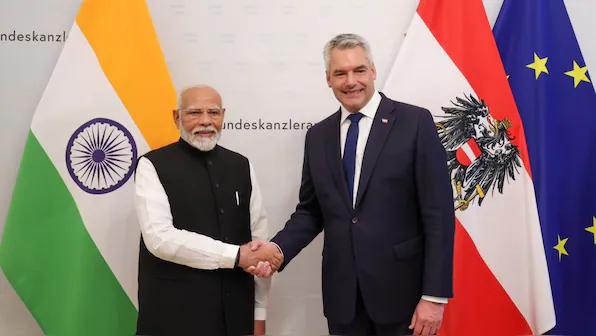Prime Minister Narendra Modi, during his historic visit to Austria, has reinforced the commitment to strengthen bilateral ties between India and Austria, emphasising core democratic values and the rule of law as shared foundations. PM Modi arrived in Vienna on June 10, 2024, for a day-long State visit. Here, he met Austrian Chancellor Karl Nehammer.
The visit holds special significance as it marks several decades since an Indian Prime Minister last visited Austria, coinciding with the 75th anniversary of diplomatic relations between the two nations. PM Modi expressed his delight, saying, “Had an excellent meeting with Chancellor Karl Nehammer. This visit to Austria is very special because it is after several decades that an Indian Prime Minister is visiting this wonderful country. It is also the time when we are marking 75 years of the India-Austria friendship.”
“There are several shared principles that connect us such as democracy and rule of law. In the spirit of these shared values, Chancellor Karl Nehammer and I agreed to further cement the India-Austria friendship across various sectors,” he said in a post on X.
Economic cooperation emerged as a pivotal theme in their discussions, with both leaders acknowledging the potential for enhancing trade and investment ties. PM Modi highlighted in his post, “Stronger economic ties naturally featured in our talks but we do not want to limit our friendship to only this aspect. We see immense potential in areas like infra development, innovation, water resources, AI, climate change and more.”
Lauding the ties shared between Austria and India, Austrian Chancellor Karl Nehammer on July 10, 2024, emphasised that it is a relationship of trust that began in the 1950s. He stated that it is the “concern over the development of the geopolitical situation” that united both nations.
Delivering his remarks at the joint press conference with Prime Minister Narendra Modi in Vienna, the Austrian Chancellor said, “There is a very good relationship between India and Austria. It’s a relationship of trust which began in the 1950s. India helped Austria and in 1955, the negotiations came to a positive conclusion with the Austrian State Treaty.”
“What unites India and Austria is concern over the development of the geopolitical situation,” he underlined. The Austrian Chancellor also highlighted his talks with PM Modi and stated that the two of them “had very intensive talks” about the aggression of Russia against Ukraine in the ongoing conflict.
“Last night and this morning, we had very intensive talks about the Russian war of aggression against Ukraine. For me, as the Federal Chancellor of Austria, it is particularly important to get to know India’s assessment and to understand it and familiarise India with European concerns and worries,” the Austrian Chancellor Karl said. “Moreover, the conflict in the Middle East was a major topic and in addition to this challenging geopolitical situation, we also referred to the positive aspects of our cooperation…” he added.
The meeting between the two was characterised as “extensive and fruitful” by Ministry of External Affairs spokesperson Randhir Jaiswal. In addition to bilateral matters, PM Modi and Chancellor Nehammer exchanged views on regional and global issues of mutual interest, underscoring the importance of collaborative approaches to international challenges.
PM Modi and Austrian Chancellor Nehammer also participated in the India-Austria Business Meeting, bringing together around 40 businesses from both nations to explore new economic opportunities and strengthen bilateral trade relations. The two also addressed India-Austria joint press statement, following their delegation-level talks.
Notably, this is the first time an Indian Prime Minister has visited Austria in 41 years. Indira Gandhi was the last PM to visit Austria in 1983. PM Modi’s visit to Austria comes after his two-day official visit to Russia, where he met Russian President Vladimir Putin.
















Comments